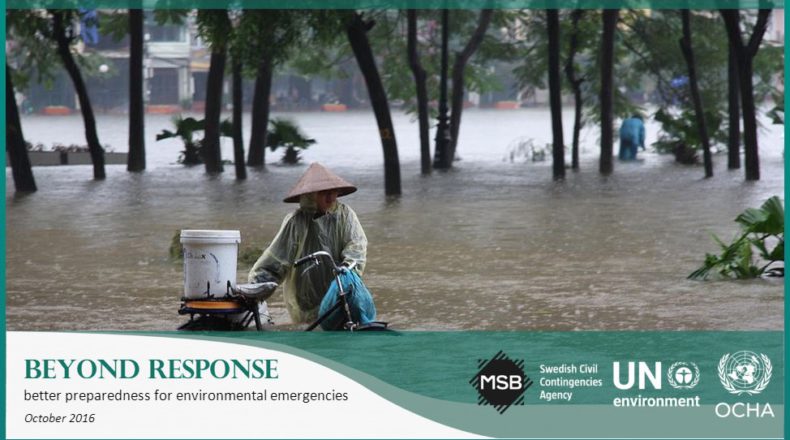The Environmental Emergencies Centre hosts a series of online learning modules developed by the UNEP/OCHA Joint Environment Unit and partners on a range of environmental emergency preparedness and response topics.
The Environmental Emergencies Centre hosts a series of online learning modules developed by the UNEP/OCHA Joint Environment Unit and partners on a range of environmental emergency preparedness and response topics.
Below are interactive courses developed to improve your knowledge of the tools and actors involved in international disaster preparedness, prevention and response. Learn how to conduct your own FEAT Assessment and improve your understanding of disaster waste management, chemical/industrial accidents and the importance of integrating the environment in humanitarian action.
Please consult the EEC-User-Guide- if you need help in accessing any of the courses. If you have any additional questions and/or experience technical difficulties, please contact us at ochaunep@un.org.
By failing to prepare you are preparing to fail – so let’s learn how to become better prepared for environmental emergencies! This course provides an interactive and user-friendly overview of the international environmental emergency response mechanisms and introduces the main actors supporting preparedness and response to environmental emergencies. It briefly introduces hands-on tools like the Flash Environmental Assessment Tool and the Disaster Waste Management Guidelines. The course is available in English. A previous version is available in French and Arabic. Please allow at least three hours for completion.
Are you an environmental expert or international first responder who wishes to gain more knowledge on how to rapidly identify, prioritize, and mitigate the impacts of chemical releases to human health and the environment? Look no further! Upon completion of this eLearning course, you will be able to demonstrate the use of the Flash Environmental Assessment Tool (FEAT) in various scenarios, recall the step-by-step procedure for conducting a FEAT assessment and propose risk reduction measures for the different types of impact. The course is available in English. Please allow at least three hours for completion.
Integrating environmental issues into humanitarian response and early recovery strategies is key in order to save lives, livelihoods and to build resilient societies. This course provides humanitarian actors with the information on how to consider the environmental aspects of humanitarian interventions, also highlighting the key opportunities, misconceptions and challenges for mainstreaming environmental issues into humanitarian work. The course is available in English, French, Spanish and Russian. Please allow at least two hours for completion.
Industrial accidents can have severe consequences on human health and the environment, including in other affected countries. This stimulating course will provide you with strengthened skills and capacity to prevent, prepare and respond to these types of incidents. Additionally, you will gain an understanding of available tools and support for industrial accident prevention and preparedness. They will also find information on how to ask and receive international assistance in preparation or response to an industrial accident. The course is available in English, French, Russian and Chinese. Please allow at least three hours for completion.
Learning to predict, identify, analyze and plan the impacts of disaster waste in an emergency is vital in order to minimize the risks of waste for disaster-affected populations as well as the environment. This course provides humanitarian staff and government authorities with increased knowledge about disaster waste management strategies in order for them to plan and mitigate these types of risk. The course is available in English, French, Spanish and Russian. Please allow at least three hours for completion.
This course aims to provide first responders, such as law enforcement, emergency medical services, and fire/rescue worldwide, with fundamental knowledge about climate change and its impact on emergency services operations. It was co-developed by the Secure Communities Forum and the UNEP/OCHA Joint Environment Unit, serving as a starting point for first responders to improve their understanding of how climate emergencies can affect their planning and operations in both routine emergency and crisis scenarios.





